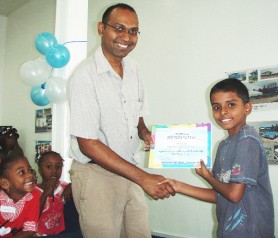– GWI monitoring Region Nine aquifers
As part of its moves to have citizens conserve water during the current dry season, Guyana Water Inc (GWI) has held a workshop with young children and is monitoring usage around the country particularly in Region Nine.

According to a press release, GWI held its first workshop under the theme ‘H2O Kids in Action’ on Saturday last for the children of its employees. According to Chief Executive Yuri Chandisingh, the workshop was particularly important now since Guyana is experiencing a prolonged dry season.
The workshop saw 45 children between the ages of 5 and 12 being exposed to interactive presentations on the importance of water to the human body, the water cycle, water purification and conservation.
They were then able to express their understanding of water conservation in their homes and schools through designing posters, dramatic presentations and skits.
GWI said the workshop forms a part of its public education programme which deals mainly with the extent to which water is wasted in Guyana.
The release quoted Chandisingh as telling the children: “It is vital that we use the water provided by GWI for beneficial purposes only, especially when we have little or no rainfall. GWI also incurs a hefty electricity bill by pumping water from our production sites to your homes – every drop wasted means money lost…”
Meanwhile, GWI is monitoring the aquifers in Region Nine (Upper Essequibo/Upper Takutu) to ensure they remain at a standard level to provide residents in the surrounding areas with an adequate supply of water.
According to a release, during the dry season, aquifers take a longer time to replenish their water supply due to little or no rainfall, resulting in the level of the water in the aquifer having the tendency to decrease. Region Nine is primarily served by a combination of hand and solar operated pumps which are fed by wells dug several feet into the aquifers.
According to the release, the water utility’s Hinterland Unit has developed a relief programme as a contingency plan in the event of a water shortage. GWI’s Hinterland Manager Akram Hussain stated that teams in Region Nine have not noticed any signs of water depletion, but should this occur, the company will immediately execute its relief programme.
One aspect of the relief programme involves drilling deeper wells in order to source more ground water, and according to Hussain, work has already commenced on the implementation of the relief programme to counteract instances of water shortage, with recently drilled wells in the areas of Hiowa and Parishara as well as the planned installation of wells in some areas being part of the programme.
In addition, Hussain said Bio-filters (household water treatment devices which remove harmful bacteria from raw water sources) will be implemented as short-term relief which would allow residents to utilize surface water resources such as creeks, lakes and streams in the absence of water supplied by underground aquifers.
GWI urged residents in the area to avoid wastage at this period of time and to utilize water only for beneficial purposes.




